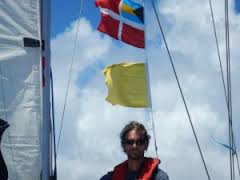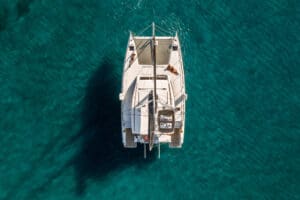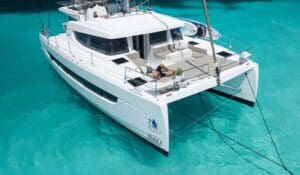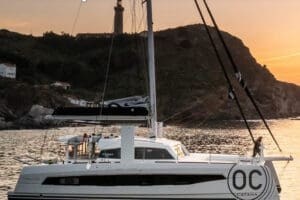Overseas Radio Network – Foreign Ports & Sailing in Bad Weather
 Topics in Overseas Radio Network Show 3, Segment 1:
Topics in Overseas Radio Network Show 3, Segment 1:
- Entering foreign ports
- Costs of port entry
- Ports where we wish we had stayed longer
- Sailing and weather
GARY FRETZ: Ahoy, mates! This is your host, Gary Fretz, with our co-hosts, Stephen and Estelle Cockcroft. And our show is about “Yachts, the Perfect Escape Vehicle”. Now, you might be wondering why yachts make the best escape solution. Well, it is because you can find liveaboard yachts for $15, 000 or $15 million and everywhere in between. They serve as your home and they provide inexpensive transportation around the world.
For a transcript of this podcast, click “read more” below. (Also, click here to learn more about flag etiquette in foreign ports.)
Yes, it is possible to sail around the world for next to nothing using windpower. And if you would like to know how to do that, just stay tuned. Also, with recent technological innovations it’s become easy for everyone to navigate anywhere in the world with the push of a button on your GPS. And now you are going to have all the comforts of home on a yacht. Another great thing about yacht is that if you don’t like something about the country of your choice like your neighbor, the weather, or whatever, then it is very easy to cast off your lines and move just vote with your feet or as I say vote with your boat.
Entering Foreign Ports
My guests in this segment are Stephen and Estelle Cockcroft. They left South Africa in 1992 and they visited over 50 countries. They sailed all over the world and have a huge number of adventures to talk about, so let’s get down to business.
During last week’s show, we had a caller send us a question, Stephen, which is, “Could you describe and compare your experience of entering and existing third world and first world countries on a yacht? Everyone has experienced entering and exiting via land and air, but almost no one has experience on a yacht. Many people would love to hear about this.”
STEPHEN COCKCROFT: All countries have shipping. And so essentially when you are on a yacht, you are using the shipping clearing immigration and customs facilities. If you enter any country, third world or not, you should look at the same directions and find where the ports of entry are.
Once you have figured the port of entry that’s where you go. You fly your yellow flag and you fly the courtesy flag of the country you are visiting. And you get in generally. Especially third world countries you find you need to anchor off. You then take your ship’s papers, passports, and some money and you go ashore to the nearest dock and you ask where you can find customs and immigration.
Some countries have them together, some countries have them separate, but pretty much checking in to any countries, first world or not you, go to a port of entry and you clear in with the local authorities.
Port Entry Costs
GARY: How much does it typically cost?
STEPHEN: Well it depends it could be as little as $10 it could be as much as $300 the Bahamas for example $300 if you arrive at the port of entry in the Bahamas you need to buy a cruising permit which lasts you for 1 year but its $300. If you check into some of the Caribbean islands, it is $20 bucks and they give you 30 days, 60 days, depending on, they normally ask you, how long you are going to stay try and give them the longest possible period and then they clear you into the country.
In Madagascar, for example, we got there and we went to the port of entry which was called Hell-Ville on Nosy Be. We got to the immigration and they gave us a form and they said, “Go the Kodak,” which meant we had to go to the local shop where there was a photocopy machine where they photocopy entry papers because they didn’t have a lot they just had one master copy we then went back down and they borrowed our pen to fill it in and I think we paid like $3 and we were cleared into Madagascar so it is very much the same process but the experience is very different.
GARY: Wow! That sounds like night and day between arriving on an airliner and arriving on a yacht. Okay, let me ask you this. Is there a place you visited that you wished you could have stayed longer?
Ports Where We Should Have Stayed Longer
STEPHEN: Well the Indian Ocean we rushed through. I wished we had stayed longer in the Indian Ocean particularly Madagascar and that region.
ESTELLE COCKCROFT: Yes, I loved Egypt. I wished we had spent more time there. The history there was just unbelievable. Of course, you know the Sphinx, the Valley of the Kings and Queens. We stayed in a port called Safaga, traveled inland by taxi, and we met an Egyptologist there that took us through all the places. Yeah, it was just amazing and that is probably one of my most favorite places.
The other really, really great place was Lebanon. Surprisingly, the Christians in Lebanon took us in and just wouldn’t let us go. They, in fact, tried to tie us, our boat, to the bottom and wouldn’t let us go. But Stephen found out what they were doing and so we had to leave. We went on to Turkey.
GARY: Okay that sounds good. Now how often have you faced bad weather in your cruising how bad did it get?
Sailing and Weather
STEPHEN: Well first, you know, most people look at the weather before they leave so you got probably 3 or 4 days that you know what the weather is going to do. If it is a long passage after that then you got what you got. But generally we haven’t seen much bad weather. But we some really bad weather off the east coast of Africa and when we cross the IT, the inter-tropical convergence zone, and we got some pretty strong weather there up to 60 knots, but it was in flat seas. The Med was probably the worst place for weather. We had some really…you would get blows and it was very, very choppy seas.
But generally we haven’t we managed to dodge most of the bad weather because we have been very attentive to weather and forecasting.
GARY: Nowadays it is a lot easier to get good forecast, right?
STEPHEN: Oh, yeah, you can get oceans’ weather where there is an Iridium satellite phone. You can pull down weather and you can dodge weather. You know exactly what the wind speeds are going to be you know just about everything you need to know and to leave or not leave.
GARY: Okay, alright. Now when you are offshore, what keeps you awake at night? That is, you know, what worries you the most when you are off?
STEPHEN: Well, when we are offshore I guess what worries me the most is sudden squalls. If you have a sudden squall where the change of wind direction which is a problem on a sailboat. My crew is always briefed that if there is a change in wind speed 10 knots or direct direction of 10 degrees I have to be awaken up but that is essentially. And, of course, obviously, you worry about ships. We are always on the lookout for ships, often they don’t look out for you.
GARY: Right okay, we are going to have to take a short break and we will be right back, you are listening to “Yachts the Perfect Escape Vehicle” only on the Overseas Radio Network.





